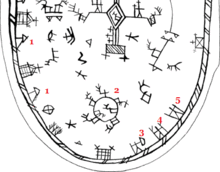
Excerpt of a sami drum of the southern sami type, with three typical motives emphasized: the storage house (1), the pound (2) and the mother goddesses Sáráhkká, Juoksáhkká and Uksáhkká (3-5).
Akka is a female spirit in Sami shamanism, and Finnish and Estonian mythology. Its worship was common and took the forms of sacrifice, prayer and various other rituals. Some Sámi believed it lived under their tents. As with other gods, its name appears within some geographical names, leaving a legacy of Sami presence.
Sami mythology
- Maderakka, the first akka, was mother of the tribe, goddess of women and children, she who gives humans their bodies. Women and girls belong to her, as do boys until they are declared men. Maderakka is popular among modern Sámi feminists. Her three daughters are:
- Sarakka, the goddess of fertility, menstruation, love, human sexuality, pregnancy and childbirth. After a birth, a woman would eat a special porridge dedicated to Sarakka. The modern Sámi women's organisation The Sarahkka formed in 1988 and is named in honor of her.[1][2][3]
- Juksakka, "akka with an arrow", the protector of children.
- Uksakka, who shapes the fetus in the mother's womb and assigns humans their sexes.
- Jabme-Akka, "the akka of the dead", is a goddess of the underworld. She soothes the spirits of dead babies, but all other spirits dwell in sorrow. Her land of the dead is said to mirror the land of the living, where everything is opposite. So, the dead are buried with the essentials of living (e.g. knives) and anything that would make their afterlife better.
Finnish and Estonian mythologies
In Finnish mythology, Akka is the wife of Ukko and is the goddess of fertility. As they make love, thunder rolls. She can be seen as the female side of nature, Maaemonen "mother earth", whom Ukko fertilizes.
In Estonian mythology, she is known as Maa-Ema.[4][5]
References
- ^ Andrews, Sara. "Women in Saami Society". Retrieved 11 August 2013.
- ^ Olakunle, Olusegun Olawale. "The Sarahkka – Sámi womans organization". Project 200501253-39. University of Trømso. Retrieved 11 August 2013.
- ^ Olakunle, Olusegun Olawale (2006). The Sarahkka and The Sami Nisson Forum : a general overview of their historical background, and a consideration on the roles of these Sámi women organisations in the quest for the right to self-determination of the Sámi indigenous peoples of Norway. Tromsø: O. O. Olakunle.
- ^ Guirand, Félix (1959). Larousse encyclopedia of mythology. Prometheus Press. p. 318.
- ^ Carlyon, Richard (1981). A guide to the gods. Heinemann/Quixote. p. 257. ISBN 9780434980055.